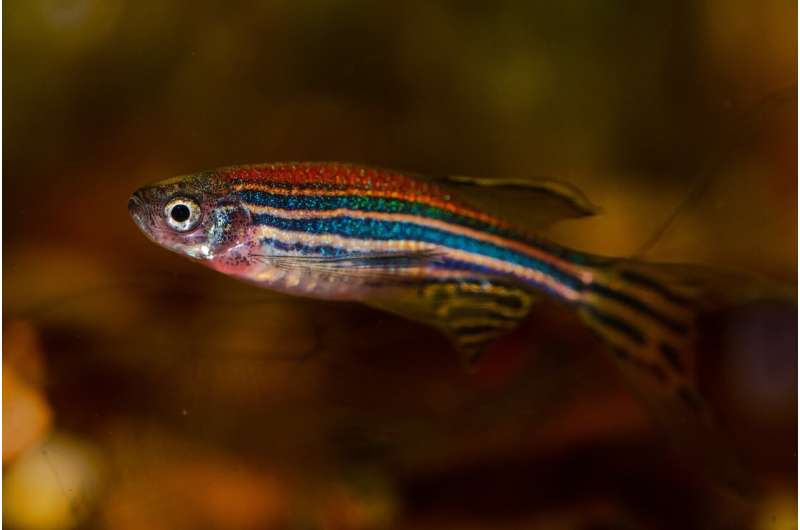This article has been reviewed according to Science X's editorial process and policies. Editors have highlighted the following attributes while ensuring the content's credibility:
fact-checked
trusted source
proofread
Even very low levels of pesticide exposure can affect fish for generations, study finds

Fish exposed to some pesticides at extremely low concentrations for a brief period of time can demonstrate lasting behavioral changes, with the impact extending to offspring that were never exposed firsthand, a recent study found.
The findings raise concerns not just for fish, but for all vertebrates that are exposed to commonly used pesticides—including humans, said study co-author Susanne Brander, an associate professor and ecotoxicologist in Oregon State University's Hatfield Marine Science Center.
"This exposure is happening not just to these fish, but to all aquatic organisms in areas that are receiving runoff from areas populated by humans," Brander said. "It's safe to say that we're seeing influences at the population level if fish that were exposed for a few days as embryos and larvae are then producing offspring that are developmentally deformed, or males that are not able to produce as much sperm."
Climate change is also expanding the geographic range of many insect species, leading to increased and more widespread pesticide use in both agricultural and residential settings, and increasing the potential for more organisms to be exposed to harmful chemicals.
The study, published in the journal Environmental Science and Technology, used inland silversides as a model fish species common in North American estuaries and marine waterways, with a specific focus on the San Francisco Bay and Sacramento-Joaquin Delta.
OSU researchers chose three commonly-used pyrethroid pesticides (bifenthrin, cyfluthrin and cyhalothrin) due to their high neurotoxicity and consistent presence in Bay-Delta waters. These pesticides are also widely used and detected nationwide.
For the experiment, researchers exposed silverside embryos to the different pesticides for 96 hours, at a concentration of 1 nanogram of pesticide per liter of water. That's approximately a teaspoon of pesticide in an Olympic-sized swimming pool, Brander said.
After 96 hours, the fish larvae were placed in clean water and reared until they were five weeks post-hatch. They were then kept in larger tanks until they reached reproductive maturity at about eight months old. At that time, researchers spawned the adult fish and collected their offspring to be reared in clean water. Behavioral responses were measured in larval parents as well as the larval offspring.
Researchers found the fish that were originally exposed to pesticides demonstrated hypoactive behavior, or decreased activity, at the larval stage, which could lead to them not seeking food as much as the control group, if they were in the wild.
Conversely, the second generation of fish—the generation that was never exposed to pesticides, except through their parents—demonstrated hyperactive behavior, swimming more and acting overstimulated compared to the control. Researchers hypothesize this was a compensatory response to the hypoactive behavior of the previous generation.
The tests also found that adult male fish exposed to bifenthrin an cyhalothrin as larvae had smaller gonads than the control group, while the second generation had increased fecundity.
While a lot of research focuses on zebrafish as a model for human health, Brander says many fish species share a large percentage of their genes with humans, and thus can be used as models to predict how humans might respond to a chemical.
"This study is another demonstration of how early-life exposure to these chemicals can affect fish for months and, in the case of humans, for potentially years," Brander said.
"We could potentially use this as a model for how human babies or humans in utero could respond to these chemicals—fish use the same hormone receptors as we do; the same steroids. So something that interferes with reproduction in fish could potentially have the same effect on humans."
The results showed that the fish were able to adapt in some ways to the exposure, but they might also have been overcompensating, and such changes can come at a cost to success in other biological processes like growth or predation, Brander said.
"In terms of environmental regulation, if we put stricter controls into effect because of studies like this, it's going to take a few generations of fish—or whatever the organism is—for them to completely recover," she said.
Lead author on the study was OSU doctoral student Sara Hutton, who graduated last year and now works in environmental consulting.
More information: Sara J. Hutton et al, Multigenerational, Indirect Exposure to Pyrethroids Demonstrates Potential Compensatory Response and Reduced Toxicity at Higher Salinity in Estuarine Fish, Environmental Science & Technology (2024). DOI: 10.1021/acs.est.3c06234
Provided by Oregon State University




















